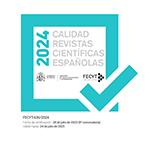¿Universalismo moral de la Ilustración versus multiculturalismo en las sociedades del siglo XXI?
Resumen
El artículo quiere examinar la cuestión de si hay incompatibilidad entre el universalismo moral de la Ilustración y el multiculturalismo de las sociedades del siglo XXI. Para ello analiza en qué consistió el universalismo moral de la Ilustración. De la mano de Habermas utiliza una distinción entre el proyecto procedimental-formal de la Ilustración y sus contenidos concretos, para señalar que lo importante era lo primero y que en el corazón de este proyecto ilustrado estaba la libertad de ser diferente, que era uno de los valores más importantes que la Ilustración quería extender, de manera que el universalismo moral no sólo no es incompatible con la diversidad cultural, sino que sería su condición de posibilidad. Seguidamente, el artículo analiza dos de las principales maneras de entender el multiculturalismo, las de Habermas y Appiah. El artículo acaba mostrando que incluso algunos de los más fervientes defensores del multiculturalismo, como Appiah o Parekh, admiten que para un mundo multicultural es esencial la existencia de algunos valores morales universales.Descargas
Descarga artículo
Licencia
La revista Logos. Anales del Seminario de Metafísica, para fomentar el intercambio global del conocimiento, facilita el acceso sin restricciones a sus contenidos desde el momento de su publicación en la presente edición electrónica, y por eso es una revista de acceso abierto. Los originales publicados en esta revista son propiedad de la Universidad Complutense de Madrid y es obligatorio citar su procedencia en cualquier reproducción total o parcial. Todos los contenidos se distribuyen bajo una licencia de uso y distribución Creative Commons Reconocimiento 4.0 (CC BY 4.0). Esta circunstancia ha de hacerse constar expresamente de esta forma cuando sea necesario. Puede consultar la versión informativa y el texto legal de la licencia.











